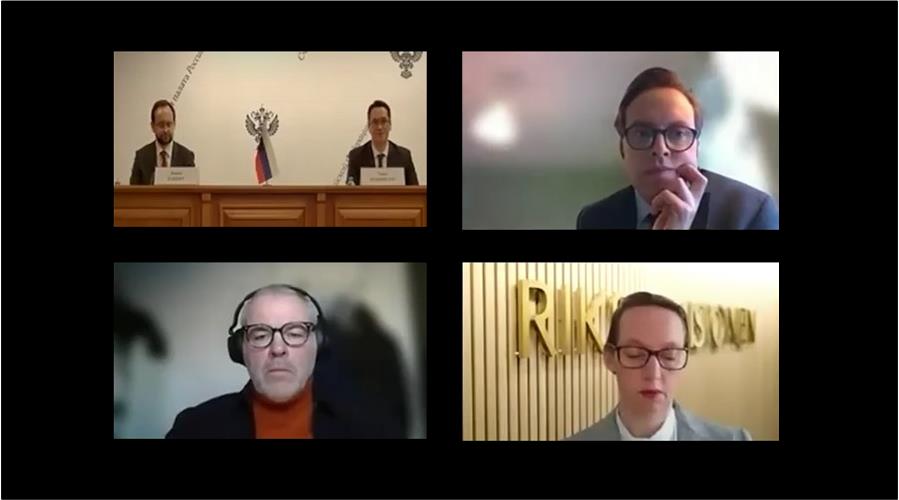
Innovations and Arctic region – areas of common interest between Russia and Sweden
The Accounts Chamber of the Russian Federation and the Swedish National Audit Office held the seminar “Auditing innovations”
“2021 was announced to be a year of innovations and technologies. In accordance with the Global Innovation Index, Sweden is on the second place among European countries and it is very interesting to know the way this result is achieved. Institutional development, human resources, science and infrastructure, business development and many other aspects. Auditing innovations is a good way to evaluate the country on the whole, that is why at the Accounts Chamber recently has appeared a new audit division. International practice will help us to be effective and proactive”,
– stated Timur Makhmutov, Director of the Department for International and Regional Cooperation in his welcome address at the seminar held by the Accounts Chamber of the Russian Federation and the Swedish National Audit Office.
Catharina Cappelin, Deputy Auditor General and Head of international affairs at the Swedish National Audit Office highlighted that the Swedish side highly appreciates the opportunity to share best practices; and to present its government investment experience in the strategic innovation development and the strategic partnership formation.
According to the ACRF Board Member Dmitry Zaitsev, responsible for auditing in this sphere, innovations are essential for further sustainable development and achieving SDGs, as it is necessary to provide a proper way of production while minimizing negative effects on the environment and sustainable development:
“I believe that pandemic despite its all negative effects will become a trigger for revising the longstanding relations in the field of innovations. Innovation development is crucial for sustainable economic growth”.
He reckons government should create instruments to provide a sustainable and positive trend of innovation development. And SAIs have an important task to monitor the effectiveness of public policy.
Dmitry Zaitsev also highlighted the Accounts Chamber’s Key Activities and main approaches to the audit of innovative development in the Russian Federation. The Accounts Chamber is planning to develop methodological recommendations on assessing government support in innovations. Four steps will include taking into account the inherent risks of innovation, adopting a portfolio approach, ensuring the compliance of state support with goals and objectives outlined in national strategic documents, implementing a risk-based approach.
Portfolio approach will help to assess the effectiveness of investments in innovation via following measures and steps:
- Legislation: establishing an acceptable level of financial risks for development institutions in the field of innovation and technology entrepreneurs.
- Developing criteria and identifying performance indicators related to the assessment of
government support of innovation activities.
- Offering a comprehensive set of measures aimed at enhancing government innovation
policies.
- Formulating policy recommendations related to development institutions in the field of
Innovation.
- Developing approaches to assessing the effectiveness of government participation in the country's innovative development.
“Interacting with the government, business and society the Accounts Chamber acts as a partner for the government, our aim is not only to find out violations, but to prevent them”,
– added Dmitry Zaitsev to his speech.
Peter Jörgensen, Chief auditor and project manager for the audit of the state program "Innovation through partnership" shared the experience of SNAO:
“There are many government-financed programmes to support innovation in Sweden, total investment is around € 1 billion for the national government, with roughly the same in co-financing from public and private partners. SNAO audits innovation-oriented programs regularly but not continuously”.
Discussion of the second part of the meeting was dedicated to auditing the development of the Arctic region. The focus is on the transport, logistics, infrastructure, climate and other environmental problems. As the members of the Arctic Council Russia and Sweden contribute much to this agenda.
Valeriya Kirova, Head of the Inspection at the Department of Audit of Environmental Management and Agroindustrial Complex, shared ACRF’s experience in strategic auditing that helps to develop institutional recommendations for implementing measures and solutions to enable risk mitigation.
“According to our plans, we are to audit achievement of strategic goals in the Arctic region. Now we are at the first stage – preparatory one, when we do preliminary research and design matrix creation. Then follows evidence gathering, hypothesis testing and the final stage is a report preparation. It will help us to identify potential areas and situations that could hinder strategic goal achievement, identify risks and analyze those most important and critical to achieving strategic goals, make recommendations for the strategic audit subject on how to create and improve their risk management system”,
– she stated in her presentation. ACRF auditors have already found 116 factors that influence achievement of the environmental goals set forth in the Arctic Zone of the Russian Federation Development Strategy.
Anna Khomenko, Deputy Chairman of the Accounts Chamber of the Yamal-Nenets Autonomous Area, also supported the importance of the development auditing methods:
“During our parallel expert and analytical activity at the preparatory stage we faced the following difficulties: lack of experience in holding such activities, lack of statistical indicators for assessment, lack of possibilities to hold face-to-face working meetings due to the undeveloped transport infrastructure of the territories”.
Swedish colleagues also have their national strategy for the Arctic region. It includes international collaboration, security and stability, climate and environment, polar research and environmental monitoring, sustainable economic development and business interests, securing good living conditions. While selecting audit projects SNAO takes into account its annual audit plan and four basic criteria such as risk and materiality, value added, timing, operability.



